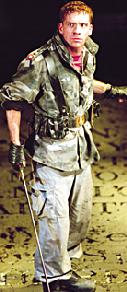SEARCH CurtainUp
REVIEWS
FEATURES
NEWS
Etcetera and
Short Term Listings
LISTINGS
Broadway
Off-Broadway
BOOKS and CDs
OTHER PLACES
Berkshires
London
LA/San Diego
DC
Philadelphia
Elsewhere
QUOTES
On TKTS
LETTERS TO EDITOR
FILM
LINKS
MISCELANEOUS
Free Updates
Masthead
Writing for CurtainUp NYC Weather
Henry V
By Lizzie Loveridge
From this day to the ending of the world,
But we in it shall be remember'd;
We few, we happy few, we band of brothers;
For he to-day that sheds his blood with me
Shall be my brother; be he ne'er so vile
This day shall gentle his condition:
And gentlemen of England, now a-bed
Shall think themselves accurs'd they were not here,
And hold their manhoods cheap while any speaks That fought with us upon St Crispin's Day.
-- Henry V
But we in it shall be remember'd;
We few, we happy few, we band of brothers;
For he to-day that sheds his blood with me
Shall be my brother; be he ne'er so vile
This day shall gentle his condition:
And gentlemen of England, now a-bed
Shall think themselves accurs'd they were not here,
And hold their manhoods cheap while any speaks That fought with us upon St Crispin's Day.
-- Henry V

William Houston as Henry V
|
Henry V is an almost complete study of the war with France in the early 1400s told entirely from the English point of view. The first part of the play looks at the causes of the war, the preparations for war and the people who will be fighting on the English side. The middle is the actual battles, the siege of Harfleur and Agincourt itself and of course Henry's wonderful speeches. Finally come the spoils of battle, the marriage and the peace. There is the taunting tennis ball challenge from the Dauphin of France (Alexis Daniel), directed against King Henry's youth and inexperience, brilliantly staged as tennis balls continue to fall from above for some time. At society's lowest level, a band of rock musicians play for the wedding of Pistol (Richard Bremmer) and Mistress Quickly (Sandra Voe) and a riotous farewell is given by friends and family as the English soldiers leave for France. In this scene, the death of Falstaff, which takes place off stage and is usually so memorable and poetic, is swallowed up in the partying in the London tavern in this energetic production. Falstaff is simply no longer relevant, not to King Henry V (William Houston) nor to the younger people in the Cheapside tavern. In contrast, we never see ordinary French soldiers, just the inadequate leaders, the vain Dauphin underestimating Henry, King Charles VI (David Acton) older but not wiser. , not a tall figure but with a commanding presence. He speaks the verse with such intelligence and clarity. I
At society's lowest level, a band of rock musicians play for the wedding of Pistol (Richard Bremmer) and Mistress Quickly (Sandra Voe) and a riotous farewell is given by friends and family as the English soldiers leave for France. In this scene, the death of Falstaff, which takes place off stage and is usually so memorable and poetic, is swallowed up in the partying in the London tavern in this energetic production. Falstaff is simply no longer relevant, not to King Henry V (William Houston) nor to the younger people in the Cheapside tavern. In contrast, we never see ordinary French soldiers, just the inadequate leaders, the vain Dauphin underestimating Henry, King Charles VI (David Acton) older but not wiser. e is good. I liked the speaking of the choruses using almost all of the cast to great effect.
Hall uses symbols associated with twentieth century wars with the play opening with, on the floor a cross of St George, the red of the cross made up of individual poppies, like those which represent the dead of the First World War in the Somme. When the flag is removed, the "stone" floor is inscribed with text from the play. Dominating the stage on raised platforms are massive industrial wheels that you might find at the pithead of a coal mine. The tavern scene is reminiscent of the nationalism you might see from a bunch of football rowdies chanting to the backdrop of the Union Flag. To stage the sailing to France, the cast assembles, rising and falling to create the motion of a boat on the waves. At Harfleur, ladders are raised to the Circle and high above in the audience are some of the besieged citizens. The English soldiers climb the ladders and torches are shone into the audience as we too become the besieged. The French have a parachute backdrop to the court. One memorable moment is when the audience sees two figures silhouetted, one that of Bardolph (Arthur Cox) hanged for crimes, the other of the king. The English dress is modern, camouflage uniforms but the French fight in black rubber riot gear, with all the trappings but without the heart. The battle scenes are lit red and fought with an assortment of truncheons. The French Princess sings "La Vie en Rose" backing up the feel of France being a twentieth century café society.
What a promising and vivid start for the younger Hall as Prince Hal comes of military age.
| HENRY V
Written by William Shakespeare Directed by Edward Hall With: Gavin Abbott, David Acton, Claire Adamson, Richard Bremmer, Vincent Brimble, Kenneth Bryans, William Buckhurst, Sandra Clarke, Arthur Cox, Sam Cox, Alexis Daniel, Keith Dunphy, Ann Firbank, William Houston, Nicholas Khan, Russell Layton, David Lyon, Christian Mahrle, James O'Donnell, Joe Renton, Joshua Richards, Adrian Schiller, Michael Thomas, Sandra Voe, Catherine Walker. Design: Michael Pavelka Lighting Design: Ben Ormerod Movement: Ian Spink Sound Design: John Leonard Music and Arrangements by Simon Slater Running time: Three hours 20 minutes with an interval Box Office: 020 7638 8891 Booking to 21st April 2001 Reviewed by Lizzie Loveridge based on 22nd March 2001 performance at the Barbican, Barbican Centre, Silk Street, London EC2 |


